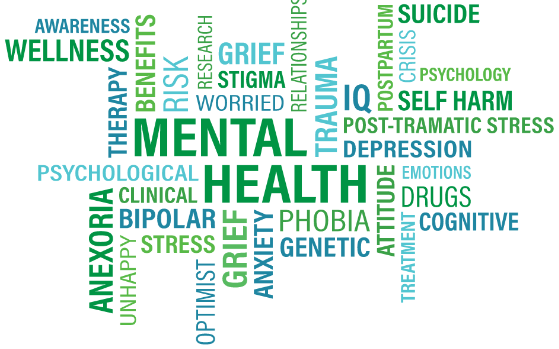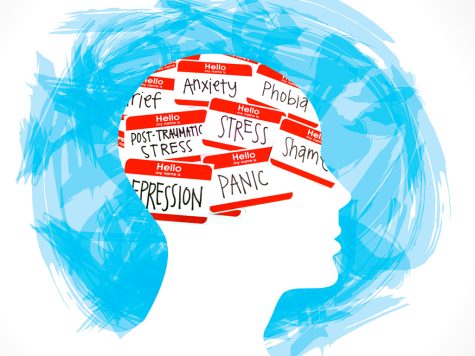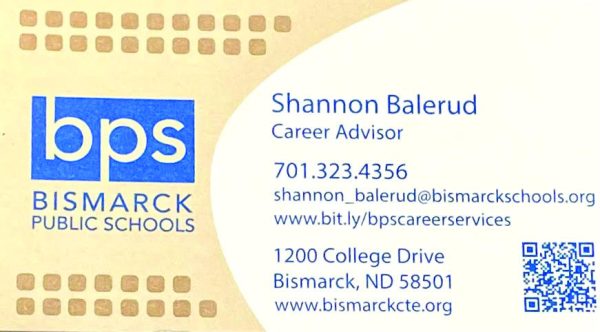“Just cheer up”
May is mental health awareness month and the discussion of mental health is as important as ever with the media constantly either glamorizing or demonizing it.

Trigger warning, brief mention of self harm
Due to the sensitivity of this topic, the author and interviewees chose to keep it anonymous and use pseudonyms.
In high school, mental health is one of the biggest problems teenagers and young adults face, along with substance abuse, eating disorders, their home life and motivation. It all goes hand in hand and tends to affect each other. When students start lacking in one category, others tend to follow shortly after.
“So many different things are happening in all of the students’ lives that can be overwhelming or detrimental to their mental health,” BHS counselor Savannah Hogue said. “Relationships (friendships, romantic, or family), school, work, pressure to do well or be perfect, pressure to try drugs or alcohol, feeling alone, being abused, feeling depressed, etc.”
Mental health is extremely prominent in high school, although many students have been struggling with this for longer, not just in high school.
“I have been struggling with my mental health since 6th grade,” Levi said.
When there are so many things going into this, it is hard to just focus on and change one. The best way to actually help kids and their mental health is by just being there for them and letting them know they are not alone and always have people to talk to, no matter what.
“Talk to someone. And be honest with their parent, guardian or trusted adult as to how they are feeling,” BHS counselor Julie Berg said. “Oftentimes, kids don’t want parents to worry or ‘make a big deal of it.’”
Parents, guardians or even just a trusted adult will be some of the best people to come forward to when struggling. Friends can only help to a certain extent, whereas adults can help one to seek the proper help and care that they, or even a friend, may need.
“With the growth of technology and social media, mental health in high school students has increased drastically,” Berg said. “Parents need to be aware of what their kids are doing on social media.”
With the heavy use of social media in this day and age, it makes it hard to not struggle with mental health. Although it can be good to have the media to help with mental health, oftentimes it ends up just glamorizing it, or even demonizing those who struggle with it.
“You go on social media, and you see all these people showing where they had cut. I mean, fresh stuff, not even healed scars. It can affect a lot of people,” Kenedy said. “It has only ever hurt me – it makes me so mad, seeing people online making it seem like it is so fun to actually have those thoughts and ideas in my head.”
People need to be more careful when telling their own story and talking about their own experiences with mental health. There is a certain way to do it and things to do and not to do. A lot of things end up triggering people or just making them feel bad overall. Struggling with mental health seems to be a constant battle of whether or not someone is sick enough to receive treatment and the media only seems to prove this over and over again.

“It’s affected me by making me compare how ill I am,” Charlie said. “How ugly my illness is compared to the ones we see in the media.”
People tend to share their experiences with their own mental health a lot more now, and that can really affect other people, whether that be bad or good.
“I feel like everybody in the media speaks out for awareness but never does anything to actually help people and the people that do speak out don’t do it the right way, I am still a person, there is no need to make me feel bad or treat me specially,” Jordan said.
It is a tough and sensitive topic for discussion, making it hard for schools and adults to talk to kids and teenagers about it. According to the Centers for Disease Control and Prevention (CDC), in 2019, 36.7 percent of people that are 12-17 years of age experienced symptoms of depression and/or hopelessness. This number has only gone up and is estimated to go up in the future.
“As a high school counselor we see students on a daily basis that are struggling with their mental health,” Berg said. “The reason and severity of the issues can vary greatly.”
A lot of times, when people, especially teenagers, come out about their mental health and their struggles with it, they are constantly told they are faking it or that they need to “just cheer up.” When, in reality, it is almost never that easy.
“It’s not my fault I’m struggling, don’t tell me it’s just in my head,” Jordan said.
Bismarck High does not do anything specific right now, although in the future something will hopefully be put in place for students to be able to talk about their mental health with their peers more openly, whether that be a club or just a group of kids gathering unofficially. It is important because the environment around students is one of the most important things when it comes to mental health.
“A student’s environment plays a major role in their mental health. Their environment can include their home life, their life at school, their social life in and out of school, their social media presence, etc,” Hogue said. “A difficult home life can cause major stress on a student and impact their mental health in a negative way.”
Overall, mental health is a huge topic of discussion and very important among teenagers and young adults. As time goes on, it will only become more and more appropriate to talk about and everyone will only become more open and honest. Reaching out is one of the best and most important things people can do when it comes to mental health and it is strongly encouraged in order to give people the help they need.
“It’s a roller coaster, there are ups and downs and it’s okay and it happens,” said Levi.
If you are struggling with your own mental health, please reach out to one of the following sources.
National Suicide Prevention Hotline: 988
National Suicide Prevention Chat: https://suicidepreventionlifeline.org/chat/
Substance Abuse and Mental Health Service Administration: 1-800-662-HELP (4357)
Crisis Text Line: 741-741
Your donation will support the student journalists of Bismarck High School. Your contribution will allow us to purchase equipment and cover our annual website hosting costs.

Hannah is a very chaotic person. She can often be found writing poetry, going on walks with her dogs or crying over her busy life.








